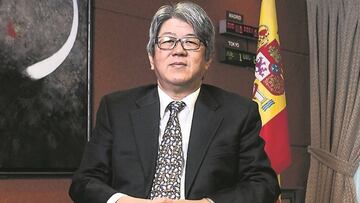Mizukami-san: "Baseball is more popular than football in Japan"
Japan's Ambassador to Spain, Masashi Mizukami-san spoke to AS about the cultural and sporting differences between the two counties.

Japan's Ambassador to Spain, Masashi Mizukami-san kindly attended Diario AS ahead of the 2016 FIFA Club World Cup and spoke about the cultural and sporting differences between the two counties.
Cultural differences
How would you define the personality traits of a typical Japanese person?
In comparison with a Spanish person, the Japanese tend to be less expressive. I think the Japanese are quite inquisitive people.
And they are known here for being quite serious...
More than that, I would say we are less expressive. Japanese people shout less than the Spanish. If you walk into a restaurant in Japan, you'll see people eating in complete silence…
Do you think the way we, the Spanish, are will come as a shock to Japanese people?
Historically, we have not had many opportunities to invite people from other places to our country. We have lived almost closed in on ourlseves, in the big cities, and in small towns. We haven't really had the need to, historically I hasten to add, explain ourselves in many words. With our comportament, and gestures, it has always been sufficient. It is a culture which is different to countries which have taken in a lot of people from other cultures. From the outside, you might get the impression that the Japanese are very educated people…

Patient people
That is the sensation we get…
Some people are quite taken aback that we will form a perfect queue to get onto the metro. But that isn't down to education. The Japanese do not want to trouble other people, and nor do they want to be troubled. At first glance, you might think the Spanish actually like annoying each other mutually (jokingly).

Popular sport in Japan
Is sport a good way of communicating?
Yes. In Japan there is a culture of exercising and activity - walking, running and so on… But there isn't a culture of teams. We have our own sports: Sumo, Kendo and Judo. But in recent years we have got to know about sports from other countries, and seeing as the Japanese are so inquisitive, we have introduced some of them in our country. The most popular is still baseball.
That seems quite strange…
Baseball is played in colleges and universities - sometimes even at primary school level. And it's a sport which has been adopted by many companies. It's a way for employees to participate in a group, together, and it's also used for marketing purposes too.
And football?
In Japan it has been harder for football to catch on with the public - it's a game of two halves, each 45 minutes and there are no pauses in play. Baseball has similar features to American football: now it's time to attack, now it's time to defend. And there are long breaks. With television it is exactly the same. Broadcasters prefer baseball because there are more commercial breaks to air adverts.
Is Sumo wrestling more than a sport?
The secret of its success is a little similar to football's… you don't need very much in the way of equipment to practice it. It doesn't bot depend on one's economic position, the poorest can practice it. Sumo is open to everyone, those who weigh a lot and those who don't…
Do you like watching football?
Yes, although I don't understand very much of it.
Have you ever been invited to Real Madrid's presidential box?
No, not yet, but my secretary is waiting for the phone call (laughs).
Do you know Florentino Pérez?
Not personally…
After seeing this interview I am sure you will be invited...
(laughs) Well...
Global audience
Related stories
It is important for Japan to be hosting the Club World Cup?
Yes. Our government is making a big effort to improve the health ouf our citizens. Fortunately, we have the longest average life expectancy in the world. But even that is not enough. We need to live longer, but in better health. Living longer in hospital doesn't help anyone, which is why it is important to promote sport.
